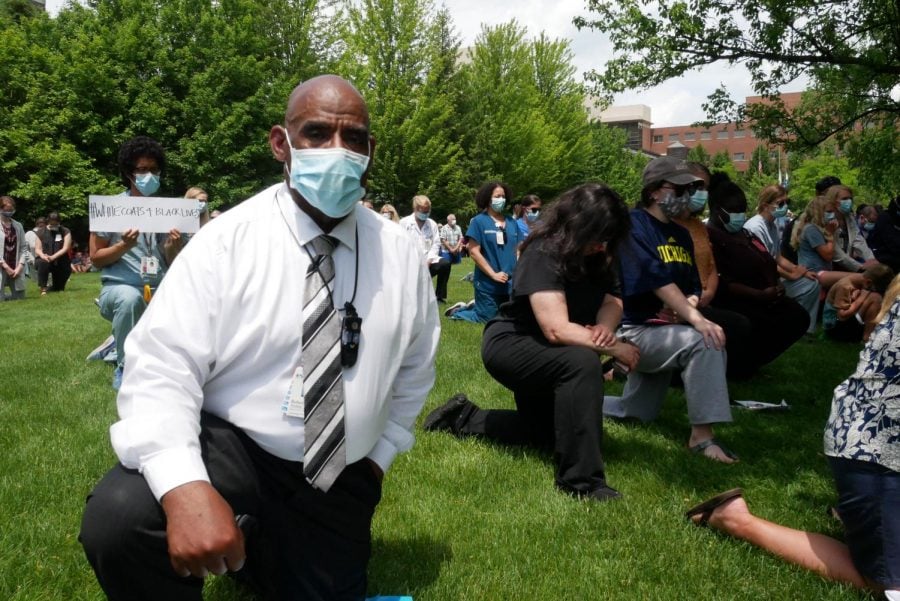Evanston hospital workers kneel in solidarity with black community
Joshua Irvine/Daily Senior Staffer
Evanston Hospital manager Bob Watkins kneels at Friday’s vigil. Hundreds attended the event, part of a nationwide movement of medical professionals showing solidarity with the black community.
June 7, 2020
Evanston health workers gathered Friday afternoon in a show of solidarity with black community, joining a nationwide “White Coats for Black Lives” movement.
Hundreds of medical professionals, hospital administrators and residents gathered on the lawn outside NorthShore’s Evanston Hospital at noon to call for racial justice and equity within the nation’s health care system. The event was one of several demonstrations held across the United States that day, part of the social media movement #WhiteCoatsforBlackLives. Many attendees wore lab coats and scrubs, despite the 80-degree heat.
At the event, Dr. Tricia Moo-Young, a surgeon at Evanston Hospital, spoke out against the treatment of black people in the professional medical community.
Moo-Young compared her racial identity in her profession to COVID-19 face coverings.
“I want it to take it off but I can’t,” Moo-Young said. “And I don’t want you to tell me to take it off. I don’t want you to tell me we can all be human. I don’t want you to tell me that color doesn’t matter.”
She went on to emphasize the many black lives that had been taken prior to the killing of George Floyd in Minneapolis last month, noting the disproportionate suffering endured by the black community for social change.
Lauren Davis, a minister at Evanston’s Second Baptist Church and rising senior at Spelman College in Atlanta, focused on the racial disparity in natal care. She recounted the deaths of Amber Rose Isaac and Tashonna Ward, two pregnant black women who died from negligent medical care.
“I can mention case after case of black women being neglected by the American healthcare system,” Davis said. “I can mention Henrietta Lacks or the Tuskegee syphilis experiment.”
According to a 2018 New York Times Magazine article, black infants are twice as likely to die as white infants — a wider gap than in 1850, 15 years before the end of slavery.
Turning to recent events, Davis noted 36 percent of Evanston’s COVID-19 patients were black, despite comprising only 16 percent of the population.
“There is a long history of black people being mistreated by the healthcare system,” Davis said. “We do not trust (health care workers), and rightfully so.”
After remarks from the two women, attendees knelt in a silent vigil for 8 minutes and 46 seconds – the amount of time a Minneapolis police officer pressed his knee to Floyd’s neck. County officials have ruled Floyd’s death a homicide.
Bob Watkins, a hospital manager, said recent events forced him to reckon with the discrimination he faced as a black man despite his work in health care.
“It’s time to realize just because I’m black and a professional doesn’t give me any privilege than someone off the street,” Watkins said.
Primary care doctors at Northshore’s Evanston Hospital coordinated the event after seeing the #WhiteCoats hashtag on social media. Loyola Medicine and Northwestern Medicine employees also participated in similar events in the Chicago area Friday.
At the close of the vigil, NorthShore physician and organizer Dr. Geeta Maker-Clark, took to a loudspeaker for a final plea.
“Check your biases,” Maker-Clark said. “Do your learning. Figure out how to be an anti-racist.”
Email: [email protected]
Twitter: @joshuajirvine


